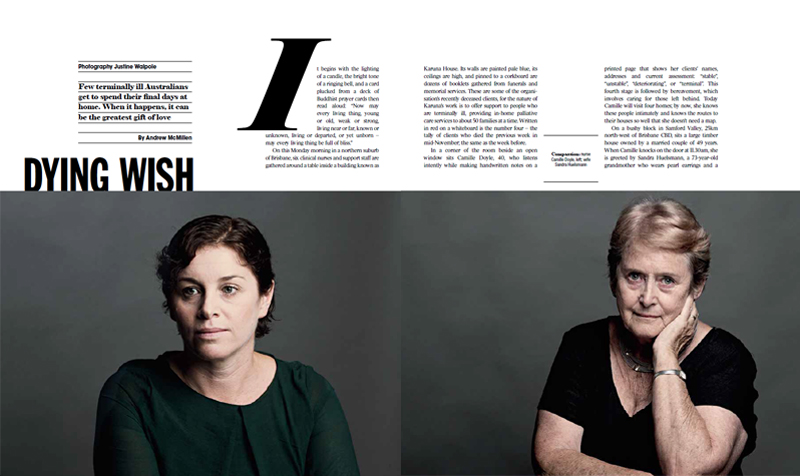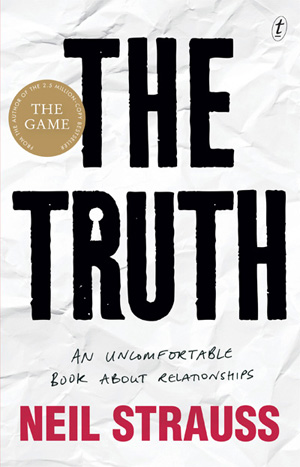The Weekend Australian Magazine story: ‘Dying Wish: In-home palliative care nursing’, February 2017
A feature story for The Weekend Australian Magazine, published in the February 11 2017 issue. Excerpt below.
Few terminally ill Australians get to spend their final days at home. When it happens, it can be the greatest gift of love.
It begins with the lighting of a candle, the bright tone of a ringing bell, and a card plucked from a deck of Buddhist prayer cards then read aloud: “Now may every living thing, young or old, weak or strong, living near or far, known or unknown, living or departed, or yet unborn – may every living thing be full of bliss.”
On this Monday morning in a northern suburb of Brisbane, six clinical nurses and support staff are gathered around a table inside a building known as Karuna House. Its walls are painted pale blue, its ceilings are high, and pinned to a corkboard are dozens of booklets gathered from funerals and memorial services. These are some of the organisation’s recently deceased clients, for the nature of Karuna’s work is to offer support to people who are terminally ill, providing in-home palliative care services to about 50 families at a time. Written in red on a whiteboard is the number four – the tally of clients who died the previous week in mid-November; the same as the week before.
In a corner of the room beside an open window sits Camille Doyle, 40, who listens intently while making handwritten notes on a printed page that shows her clients’ names, addresses and current assessment: “stable”, “unstable”, “deteriorating”, or “terminal”. This fourth stage is followed by bereavement, which involves caring for those left behind. Today Camille will visit four homes; by now, she knows these people intimately and the routes to their houses so well that she doesn’t need a map.
On a bushy block in Samford Valley, 25km north-west of Brisbane CBD, sits a large timber house owned by a married couple of 49 years. When Camille knocks on the door at 11.30am, she is greeted by Sandra Huelsmann, a 73-year-old grandmother who wears pearl earrings and a silver heart necklace. “Hello, Millie,” says Sandra, smiling. They hug, and Sandra welcomes the nurse into a home she has visited regularly for the past six months, an unusually long relationship for Karuna. The longer duration reflects the complex nature of this particular palliative situation.
On an adjustable bed in a room towards the front of the house is Tony Huelsmann, a retired dancer, choreographer and dance instructor whose skills were once in high demand at schools throughout Melbourne and Brisbane. Sandra was one of his dance students. He was 30 when they met, seven years older than her, and it was love at first sight.
Born in Germany, Tony has spent much of his life in Australia. Now 80, he is dying from complications associated with several internal and external cancers, including a rash of angry red squamous cell carcinomas that have colonised the skin of his swollen upper thighs. These painful sores require daily dressings, performed by a personal care worker, while Karuna’s rotating roster of nurses help with symptom management, bed-baths, toileting and bedding changes, as well as emotional support for both husband and wife.
Since May, Tony’s world-spanning life has been confined more or less to these four walls while Sandra cares for his every need. At night, she snatches sleep where possible. It is their wish for Tony to die at home and they are both determined to see this wish fulfilled.
To read the full story, visit The Australian. Above photo credit: Justine Walpole.

